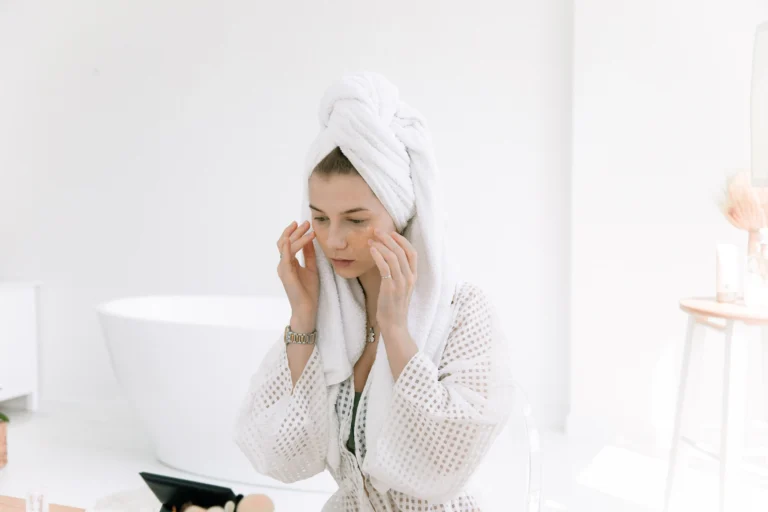Is jojoba oil likely to block pores? Many individuals ponder this as they think about adding jojoba oil to their skincare regimen. Originating from the jojoba plant’s seeds, jojoba oil is a waxy substance known for its potential advantages for the health of skin and hair. However, like with any skincare product, it’s critical to assess if it could cause issues, such as clogged pores and acne flare-ups.
As it turns out, jojoba oil is non-comedogenic, which means it does not clog pores. This characteristic makes it a popular choice for individuals with acne-prone or sensitive skin who want to avoid pore-clogging ingredients. In fact, the composition of jojoba oil closely resembles that of our skin’s natural sebum, helping it to balance oil production. So, while jojoba oil is generally safe and beneficial for most skin types, it’s crucial to understand how to use it properly and be aware of any potential risks and side effects.
Table of Contents
What is Jojoba Oil?

Jojoba oil is a unique, natural substance extracted from the seeds of the Simmondsia chinensis plant, commonly known as the jojoba plant. Despite its name, jojoba oil is not actually an oil but a liquid wax ester, which closely resembles the skin’s natural sebum. This makes it an ideal ingredient for skincare and haircare products.
Found in many beauty and personal care products, jojoba oil offers numerous benefits due to its rich composition. It contains a high concentration of essential fatty acids, vitamin E, and antioxidants, all of which contribute to its beneficial properties.
✅ Great moisturizer
✅ Not sticky
✅ High quality
❌ Doesn't contain fragrance
One of the most noteworthy features of jojoba oil is its noncomedogenic nature. This means it does not clog pores, making it suitable for people with oily or acne-prone skin. Its hypoallergenic properties also make it suitable for those with sensitive skin, as it is less likely to cause irritation or allergic reactions.
In addition to its benefits for the skin, jojoba oil is also used for hair care, as it can help with reducing hair loss, improving scalp health, and adding shine. Its versatility makes it a popular ingredient in a wide range of cosmetic products.
Does Jojoba Oil Clog Pores?
Jojoba oil has become a popular ingredient in skincare products, but does it actually clog pores? The answer is no, jojoba oil is non-comedogenic, which means it should not clog pores. This characteristic makes it suitable for those suffering from acne and oily skin.
But why is jojoba oil considered non-comedogenic? Scientifically speaking, jojoba oil has a structure that closely resembles the skin’s natural sebum. This similarity allows it to effectively moisturize the skin without causing pore congestion. As a result, using jojoba oil can lead to fewer breakouts and a cleaner, more refreshed complexion.
With its hydrating properties, jojoba oil can make the skin more supple and radiant. It is also a rich source of antioxidants and vitamin E, which may contribute to healthier skin. While it generally does not clog pores, skin reactions may still occur depending on the individual’s sensitivities.
So, is jojoba oil safe for all skin types? Generally, yes. But as with any new skincare product, it’s essential to patch test before incorporating it fully into your routine. And remember to keep the application light to avoid overwhelming the skin and potentially causing unwanted reactions.
Clogged Pores and Comedogenicity

Clogged pores, or comedones, occur when hair follicles are blocked with skin debris and sebum. Comedogenicity refers to a substance’s tendency to cause these blockages and promote the formation of comedones. The higher the comedogenic rating, the higher the likelihood of a substance clogging pores and causing acne (“Pore Clogging Ingredients To Avoid – Must Read If Acne Prone!”).
But, where does jojoba oil stand on the comedogenic scale? According to eatquickhealthy.com, jojoba oil has a rating of “2,” making it slightly comedogenic. This means that while it has the potential to clog pores, it’s not very likely.
So, why is it a popular ingredient in skincare products? The Beautyholic explains that jojoba oil is non-comedogenic, meaning it will generally not clog pores while offering hydration and increased skin suppleness. This makes it a suitable option for those with oily or acne-prone skin who are looking for a way to keep their skin moisturized and refreshed.
Some tips for preventing clogged pores include:
- Avoid touching your skin with unwashed hands.
- Exfoliate your skin with gentle scrubbing or periodic chemical peels.
- Keep your skin clean and moisturized.
- Never pick at or pop pimples.
It’s essential to remember that everyone’s skin reacts differently to various ingredients. If you’re interested in using jojoba oil, it’s always best to patch test to ensure it doesn’t cause irritation or clogged pores for you.
Now that we’ve covered the comedogenicity of jojoba oil, let’s explore other aspects of this intriguing oil and how it can benefit your skin in the remaining sections of this article.
Benefits of Jojoba Oil for Skin
Jojoba oil is renowned for its exceptional benefits for the skin, providing a range of advantages without clogging pores. It’s particularly beneficial due to its noncomedogenic properties, ensuring that it won’t cause breakouts.
Hydration is one of the key benefits of jojoba oil. The oil’s emollient nature helps to moisturize the skin, making it an excellent natural option for dry or sensitive skin. Additionally, jojoba oil helps to balance the natural oil production of your skin, preventing excess oiliness that may contribute to acne formation.
Another powerful property of jojoba oil is its antioxidant content, specifically vitamin E, which aids in protecting the skin from free radicals and environmental damage. Its anti-inflammatory effects also help to reduce redness and irritation, making it an attractive option for those with acne-prone or easily irritated skin.
Jojoba oil is not only a fantastic moisturizer and protector, but it also exhibits some antibacterial properties. These can contribute to keeping your skin clean and may help in reducing the risk of infection and the formation of acne.
Incorporating jojoba oil into your skincare routine can lead to noticeable improvements in skin texture and overall skin health. Its impressive range of features, from hydration to anti-inflammatory and antioxidant properties, make it a popular choice for a variety of skin types.
How to Use Jojoba Oil Safely

When using jojoba oil, it is essential to follow certain guidelines to ensure safe and effective application. Begin by testing a small amount of the oil on your skin to rule out any potential allergies or adverse reactions. If there is no irritation, you can proceed to use the oil for various purposes.
Jojoba oil is noncomedogenic, meaning it does not clog pores and can be used as part of your skincare routine. To reap the benefits of jojoba oil as a moisturizer, apply a few drops to clean, damp skin and massage it gently. This method can help prevent clogged pores and reduce inflammation.
For hair care, add a few drops of jojoba oil to your shampoo or conditioner as a deep conditioning treatment. Also, you can apply the oil directly to the ends of your hair to help with dryness and split ends. However, avoid applying jojoba oil directly to the scalp as it may clog scalp pores.
If you’re using jojoba oil for acne-prone skin, apply a small amount to the affected area and allow it to absorb. According to Forbes Health, blending jojoba oil with another acne-fighting ingredient, like tea tree oil, can boost its effectiveness.
To enhance the properties of jojoba oil, you can mix it with other beneficial oils or ingredients, such as lavender oil, rosehip oil, or vitamin E oil, to tailor the oil to your specific needs.
Remember to follow these guidelines when using jojoba oil, and enjoy its many benefits for your skin and hair.
Expert Opinions: Jojoba Oil and Pore Clogging

In my quest for clear and healthy skin, I’ve come across various oils, and jojoba oil has always intrigued me. However, the burning question remains: Does Jojoba Oil clog pores? To find the answer, I turned to dermatologists for their expert opinions. Here’s what I discovered:
1. Non-Comedogenic Nature: Dermatologists overwhelmingly agree that pure jojoba oil is non-comedogenic, meaning it’s unlikely to clog pores. Its molecular structure closely resembles our skin’s natural sebum, making it a fantastic choice for various skin types, including oily and acne-prone.
2. Balancing Sebum Production: Jojoba oil can actually help regulate sebum production. When applied topically, it sends a signal to the skin to produce less oil, which can be especially beneficial for those with oily skin concerns.
3. Moisturizing Benefits: Dermatologists emphasize jojoba oil’s superb moisturizing properties. It provides hydration without greasiness, making it an excellent choice for dry and sensitive skin.
4. Minimal Allergenic Potential: Jojoba oil is considered one of the least allergenic oils, reducing the risk of skin irritation or allergies for most people.
Pro Tip: To reap the benefits of jojoba oil without any potential pore-clogging concerns, ensure you’re using pure, cold-pressed jojoba oil without added ingredients or fragrances. Start with a patch test to ensure compatibility with your skin.
Tips for Using Jojoba Oil in Your Skincare Routine
As someone who’s navigated the world of skincare, I understand the concerns surrounding pore-clogging ingredients. Jojoba oil, often touted for its skin benefits, can be a game-changer when used correctly. Here are my top tips for incorporating jojoba oil into your skincare routine without worrying about clogged pores:

1. Opt for Pure, Cold-Pressed Jojoba Oil: Ensure the product you choose is 100% pure and cold-pressed. This minimizes the risk of additives that could potentially irritate your skin.
2. Start Slowly: Introduce jojoba oil gradually into your routine. Begin with a small amount, especially if you have sensitive or acne-prone skin.
3. Patch Test First: Before applying jojoba oil to your face, do a patch test on a small area of skin to check for any adverse reactions.
4. Use It as a Makeup Remover: Jojoba oil is an excellent makeup remover. Apply a few drops to a cotton pad and gently wipe away makeup, including stubborn waterproof products.
5. Mix with Your Moisturizer: Combine a few drops of jojoba oil with your regular moisturizer to boost hydration without overwhelming your skin.
6. Avoid Overuse: Less is often more with oils. Using too much can lead to a greasy feeling. Start with a small amount and adjust as needed.
7. Consider Nighttime Application: Using jojoba oil in your nighttime routine can allow your skin to reap its benefits while you sleep.
My Advice: If you have concerns about potentially clogged pores, try using jojoba oil primarily as a spot treatment or for the dry areas of your skin. This way, you can enjoy its hydrating and nourishing properties without worry.
With these tips, you can confidently incorporate jojoba oil into your skincare routine, knowing that it’s possible to enjoy its benefits without the fear of clogged pores. Remember, everyone’s skin is unique, so monitor how your skin responds and adjust accordingly for a personalized skincare experience.
Does Jojoba Oil Clog Pores: A Recap
By now, it’s clear that jojoba oil is not likely to clog pores. Instead, it has numerous benefits for the skin, such as balancing oil production, reducing inflammation, and treating acne. This versatile oil closely resembles the natural oils of our skin, making it an excellent choice for many skin types.
Thanks to its non-comedogenic properties, jojoba oil can help keep both dry and oily skin healthy and hydrated, without causing congestion or breakouts. However, it’s essential to remember to keep your skin clean and exfoliated to avoid clogged pores and other skin issues.
So, should you give jojoba oil a try? If you’re looking for a natural, nourishing addition to your skincare routine, it’s worth considering. But as with any new product, it’s always advisable to test it on a small patch of skin before incorporating it fully. This way, you can ensure that it’s suitable for your specific skin type and condition.
FAQ:
Is jojoba oil safe for acne prone skin?
Yes, jojoba oil is safe for acne prone skin. It is non-comedogenic, meaning it won’t clog pores, and has anti-inflammatory properties that can help soothe and reduce acne. However, it’s important to patch test first and use in moderation to avoid exacerbating breakouts.
Can I use jojoba oil on my face everyday?
Yes, you can use jojoba oil on your face every day. However, it’s important to use it in moderation and patch test first to avoid exacerbating breakouts. Also, if you have oily skin, using too much jojoba oil can make your skin feel greasy.
What are the disadvantages of jojoba oil?
Jojoba oil is generally considered safe for external use, but ingesting it can lead to diarrhea, stomach pain, restlessness, and dry eyes. Additionally, some people may have an allergic reaction to jojoba oil, so it’s important to patch test before using it.
Does jojoba oil cause purging?
No, jojoba oil doesn’t cause purging. It’s non-comedogenic, so it won’t clog pores and cause breakouts. However, if you’re using jojoba oil for the first time and experience a sudden increase in breakouts, it may be a sign of an allergic reaction or sensitivity to the oil.
Is acne a side effect of jojoba oil?
No, acne is not a side effect of jojoba oil. It’s non-comedogenic, meaning it won’t clog pores and cause breakouts. In fact, jojoba oil has anti-inflammatory properties that can help soothe and reduce acne. However, it’s important to patch test first and use in moderation to avoid exacerbating breakouts.
If you liked this blog article about the question: Does Jojoba Oil Clog Pores, don’t forget to leave us a comment down below to tell us about your experience.






